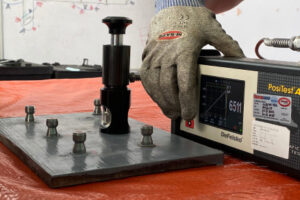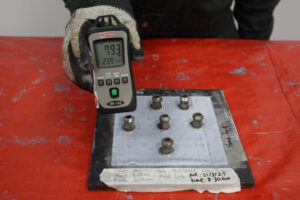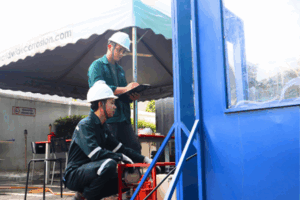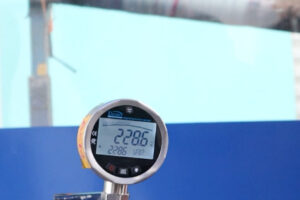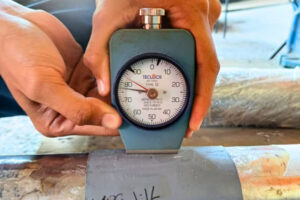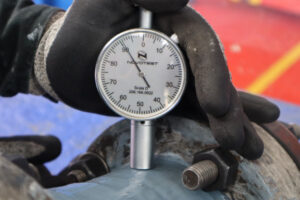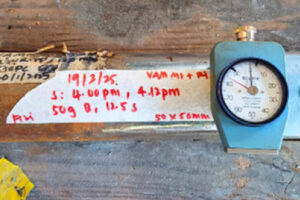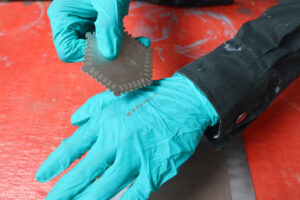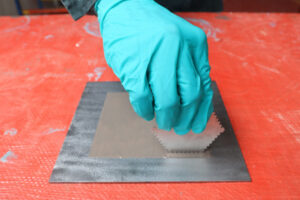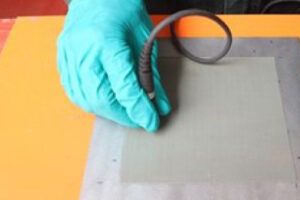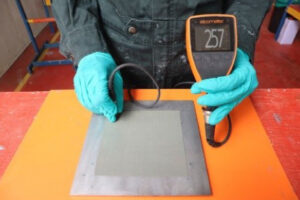Engineering / Technical Testing
i. Pull-Off Adhesion Test (Dolly Test)
Validating Coating Integrity with Precision
WCS performs standardized pull-off adhesion testing (also known as dolly testing) to assess the bond strength of applied coatings, wraps, and repair materials. This test involves applying a controlled tensile force to a dolly glued onto the coated surface, measuring how well the system adheres to the substrate.
- Ensures surface preparation quality
- Verifies the effectiveness of VAM composite applications
- Compliant with international standards (ASTM D4541 / ISO 4624)
- Reduces risks of coating failure and delamination
Whether for pipeline repairs or structural reinforcement, pull-off testing is a critical part of our quality assurance process—ensuring long-term performance and reliability in high-stakes environments.
ii. Hydrostatic Pressure Test (Hydrotest)
Proving Repair Strength Under Pressure
At WCS, we perform hydrostatic pressure testing (hydrotest) to validate the strength and sealing capability of our composite repair systems. By injecting pressurized water into the repaired pipeline or component, this test simulates real operating conditions—ensuring the system can withstand the required pressure levels safely.
- Confirms the integrity of composite repairs
- Verifies leak-tightness and mechanical strength
- Ensures compliance with pressure class specifications
- Provides assurance before system recommissioning
Safety is our priority. Every hydrotest is conducted under strict safety protocols—ensuring personnel and asset protection during high-pressure validation. With WCS, you can operate with confidence, knowing your repair has passed the toughest test.
iii. Hardness Test (Durometer)
Verifying Material Cure and Structural Integrity
At WCS, we conduct hardness testing using a durometer (Shore D scale) to evaluate the surface hardness of cured composite materials. This test ensures that materials such as epoxies and reinforced systems have properly cured and meet mechanical strength requirements.
- Uses Shore D scale for high-strength composite materials
- Verifies full cure and surface integrity before service
- Assesses resistance to indentation and surface wear
- Ensures quality control and repair reliability
- Non-destructive, fast, and field-deployable
Our engineers typically use a trusted, calibrated and accurate tool for field hardness evaluation. By integrating hardness testing into our QA workflow, we deliver dependable repairs that meet industry and safety standards – ensuring your asset is ready for operation.
iv. Dry & Wet Film Thickness Test
Ensuring Optimal Coating Performance
At WCS, we perform both Wet Film Thickness (WFT) and Dry Film Thickness (DFT) tests to ensure coating systems are applied within the specified range—delivering long-term protection and performance in aggressive environments.
Wet Film Thickness (WFT)
- Measured immediately after coating application
- Helps applicators apply the correct thickness in real time
- Prevents under- or over-application
- Uses wet film combs or gauges
Dry Film Thickness (DFT)
- Measured after the coating has cured
- Verifies that the coating meets the specification
- Critical for corrosion protection, chemical resistance, and mechanical strength
- Non-destructive testing using magnetic or eddy current gauges (e.g., Elcometer, PosiTector)


